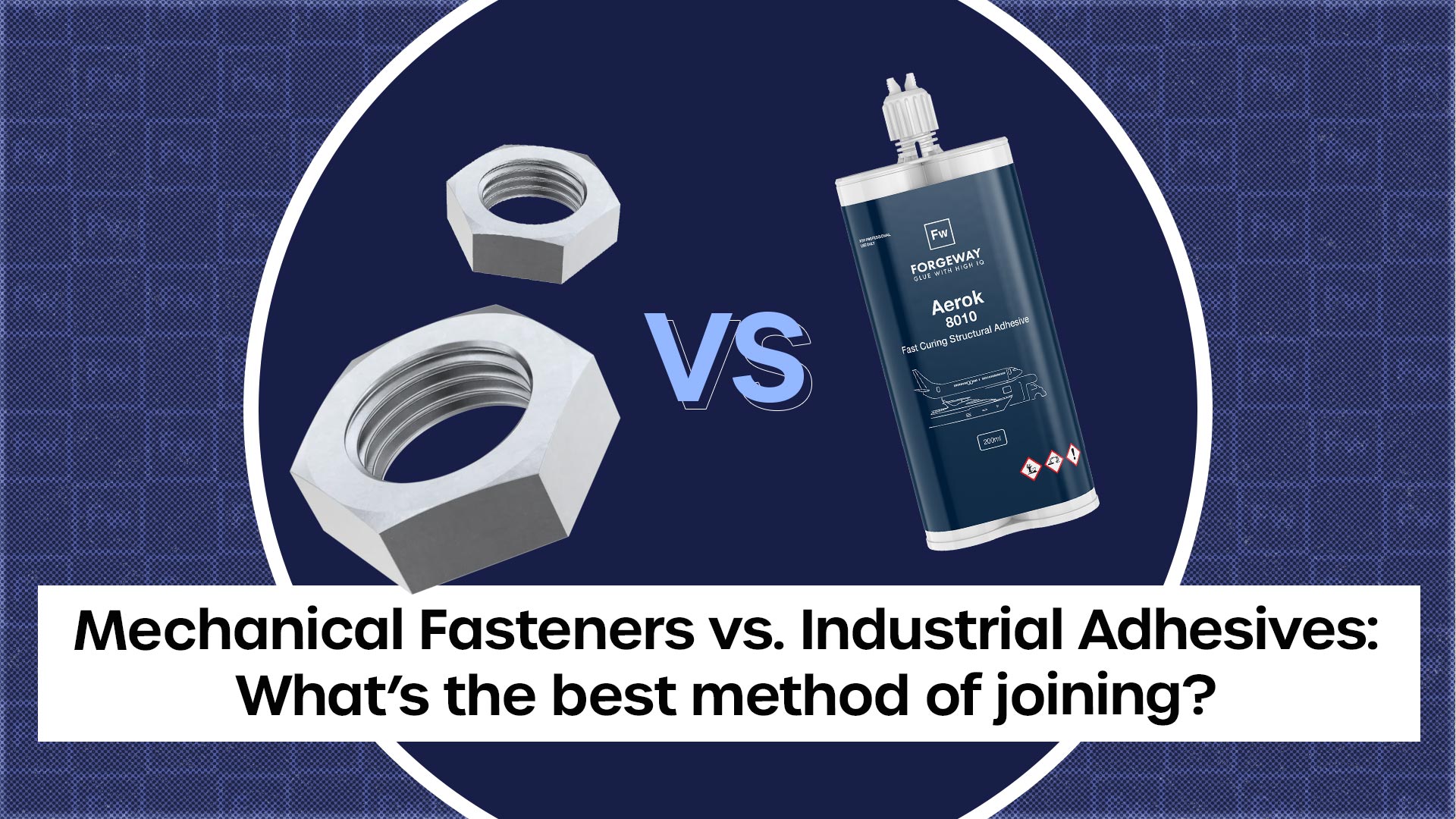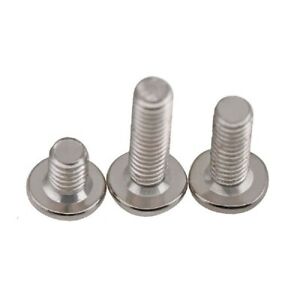Mechanical Fasteners vs. Industrial Adhesives: What’s the best method of joining?

When trying to find the best joining method, you’ll stumble upon mechanical fasteners and adhesives. But which is best? The answer to the ‘mechanical fasteners v adhesives’ debate is very subjective. Depending on whom you ask, you will get very different answers.
Instead of getting the ‘it depends’ answer you usually receive, we will look to actually provide an answer in this article.
Here at Forgeway, we manufacture adhesive solutions for a range of industries. We’ve been in the adhesive industry for over 30 years and have been asked this question multiple times.
After hearing that, you’re probably guessing what this article will be – a sales pitch.
But no, we created this article to provide an unbiased view on the question. The answers and opinions are based on the experience we have gathered over the years.
We’ve all been there, reading an article to find some helpful information only to find it is too sales-focussed. It doesn’t provide much – if any – valuable information.
That’s not what this is about. We created this article to give you an insight into everything you need to know about mechanical fasteners and adhesives so you can make a decision for yourself. We’ll talk about the positives, negatives, and costs – this article covers it all.
What is the difference between mechanical fasteners and adhesives?
This is a great place to start. Before you decide which one is better, you should definitely know a bit more about each option.
‘Mechanical fasteners’ is a fancier umbrella term for what we would call general fixings. Screws, bolts, or rivets are all examples of what we would class as mechanical fasteners. Of course, the list goes on and there are several different types of mechanical fasteners. But now you get the gist of what mechanical fasteners mean.

‘Adhesives’ is another name for glue, and comes in several different forms. If we are going very broad, some may even class cement as an adhesive.
The point is, an adhesive is any non-metallic substance that is used to bond two materials together by surface attachment.
Most of you would have already known that though. So let’s dive into learning about who uses each option and why they use them.
Why are mechanical fasteners a popular method of bonding?
They are trustworthy. Mechanical fasteners are the tried and tested method of bonding. They are extremely simple to install, they are ready to be put into use straight away (no cure time), and there is little mess involved.

Those points alone would indicate the reason behind mechanical fastener’s popularity. But they are also easy to remove and replace whilst requiring minimum amounts of training to install.
So, in summary, there are plenty of reasons for their popularity. It’s easy to see why many people in a vast range of industries use them.
Who uses mechanical fasteners?
Pretty much everyone will have used a mechanical fastener at some point. From mending the garden fence to bolting down the shed roof, people use mechanical fasteners everywhere.
But we aren’t talking about everyday use. The purpose of this article is to talk about when people use mechanical fasteners on an industrial scale. And in situations such as high-importance structures that require high-quality, strong bonding.
A prime example is the manufacturing industry. In particular, the automotive sector. They use mechanical fasteners to bond and secure all types of substrates.
Over the years, the automotive industry has used mechanical fasteners and has grown to trust them in most situations.
Panels, frames, and plastic parts (like guards and wing mirrors) are all examples of where you will likely find mechanical fasteners.

Essentially, mechanical fasteners can be – and are – used everywhere.
What are the drawbacks to mechanical fasteners?
Despite their popularity, mechanical fasteners do have a few issues. I’ve already highlighted a few but there are more.
Many people seem to think the ‘strongest’ solution is the ‘best’ solution. Beyond that, you might also be considering what’s the less expensive option.
While these are two of the most important factors, there is so much more to consider. If you are looking for the strongest solution, it could be either. If you are looking for a cheaper solution, again both could be considered ‘cheaper’. It all depends on the specification and grade of that product.
We will address the ‘cost question’ later in the article. For now, let’s focus on why mechanical fasteners may not be the best bonding method.
They offer no fire resistance, they often have issues with corrosion, and they can end up weighing a lot.
The weight is an interesting point. Up to 15% heavier than adhesives (as discussed a bit later on) isn’t too significant. But the real issue with weight comes later.
The hole drilled into the substrate can damage the structural integrity. To remediate this, ‘fixing plates’ are installed to provide additional support.
So while the mechanical fasteners themselves aren’t much heavier than adhesives, the additional support they sometimes require can end up weighing a significant amount.
You should be aware of the issues that mechanical fasteners can throw at you. A lot of these drawbacks can occur after the manufacturing process. Corrosion in particular takes time to show up.
Bear this in mind when choosing which method of bonding to go with.
Why are adhesives compared to mechanical fasteners?
Mostly because they are the best alternative to mechanical fasteners. Some say they are better than mechanical fasteners. Some also say they aren’t as good.
The answer remains subjective.
Adhesives do have several positives though. For a start, they are lighter, sometimes up to 15% lighter than mechanical fasteners.
Adhesives will also reduce the corrosion rate (when adhered to metal), have a good fatigue resistance, and will dampen vibrations.
The most significant advantage to adhesives is the lack of damage they cause. There are no requirements to damage the surface of the substrate for the bond to be effective. Yes, sometimes surface pretreatment methods are required that alter the surface of the substrate. But significant alterations that damage the surface won’t be required when using adhesives.
Who uses adhesives?
Everyone who uses mechanical fasteners will likely have used adhesives too. We will stick to a similar theme to mechanical fasteners though. The manufacturing industry.
The manufacturing industry has adopted the use of adhesives over the years. The benefits highlighted above are significant enough for some to move away from the tried and tested method; mechanical fasteners.
This is particularly the case in the automotive sector. As an example, over 80% of the bonds on the average bus will be with adhesive.

The automotive sector has increasingly used adhesives in its production lines.
What are the drawbacks to adhesives?
Adhesives aren’t the magic cure to all of these problems. They also have significant problems associated with the application process.
To begin with, they don’t bond with all surfaces. So while mechanical fasteners may require fixing plates, adhesives won’t bond with certain plastics.
We recommend the staff receive training on the adhesive before they use it. Working with adhesives is not always a simple process.
The most significant drawback to adhesives is the cure time. Granted some adhesives are quicker than others. But, there are so many varying factors in adhesive cure time that it can often be a stumbling block in the production process. All adhesives have a cure time. Longer cure times can affect throughput.
On average, mechanical fasteners are a quicker method of bonding. Yes, they take longer to apply to the substrate, but they don’t have a cure time. They reach handling strength straight away.
The majority of the drawbacks to adhesives are experienced during the manufacturing process. When the product is in use, there aren’t many that will affect the end-user.
There are multiple examples of where adhesives have failed for the end-user. The biggest reason they failed is due to improper application though.
An improper application example could be, using the wrong adhesive for the wrong application, resulting in bond failure. The other type of improper application is overapplication. This is where too much of the adhesive is applied to the surface.

In summary, adhesives also have their drawbacks.
What costs more? Adhesives or Mechanical fasteners?
The good old cost question. Everyone’s favourite. But the answer to this question is always going to be ‘it depends’. Because it does depend on various different factors.
You will need to read further to find out why it depends and what can affect the price. Or I could just tell you mechanical fasteners cost more on average and that would be enough of an answer for you.
No? Thought not. There are so many different factors that can affect the price of adhesives and mechanical fasteners.
If we are talking purely about the monetary cost it makes the answer easier. But in most industries, time is also a very big cost. “Time is money.”
On average the mechanical fastening process will cost more money but will not take as long as the adhesive process.
Adhesives are the opposite.
It all depends on what you value more. If time is more significant than price, mechanical fastening is the method for you.
You may be wondering “is this always the case?” The answer is no. As mentioned there are factors that can affect the price.
You could find that the mechanical fastening process is quicker and cheaper. It all depends on the situation in which you find yourself.
Factors that are likely to affect cost are:
- Classification: This could affect both mechanical fasteners and adhesives. It goes without saying, the higher the specification of the product, the more it will cost. For example, a 25mm bolt will cost less than a 100mm bolt.

- Base chemistry: Once again, this can affect both methods. The base chemistry is what makes up the adhesive or the mechanical fastener. A typical example would be where an MS polymer-based adhesive would cost less than a Methyl Methacrylate-based adhesive.
- Training requirements: This would be more of an issue with adhesives. As discussed, the application process is difficult. High-quality and effective training is likely to cost between £500-£2500.
- Staff resources: With mechanical fastening, in particular, getting enough manpower is an issue. This isn’t only because finding enough operatives who are qualified is difficult. The mechanical fastening process requires a lot of people to complete.
So, now you have considered all these factors, we will talk about the actual cost of both methods.
Mechanical fasteners will likely cost £25 to bond a square meter of the substrate.
Adhesives will likely cost £15 to bond a square meter of the substrate.
These are simple estimates. But on average we would say this is the likely cost.
Adhesive or Mechanical fasteners: Which should you choose?
It is a subjective question once again because it is very much down to your opinion. But, let’s do our best to avoid a vague answer. An adhesive solution may present difficulties during the manufacturing process of which you weren’t aware. And this issue may be a deal-breaker for you.
We could also say the same about the long-term performance of mechanical fasteners. It is down to you, and what you want.
Here at Forgeway, we are specialists in adhesives. We have advised a wide range of people from automotive and medical supplies manufacturers to cladding and fire door manufacturers.
Some went away, happy in the knowledge that mechanical fasteners would suffice. Others went away with a competent adhesive solution. Some even went away using both. Every situation was different.
We understand you may be feeling the same. That your situation is completely different from anything we have covered in this article. As I’m sure you can understand, we couldn’t cover every situation.
Mechanical fasteners are a good fit for you if you are looking for a trusted bonding method that is quick but slightly more expensive. There are several things to consider if you are looking to go ahead with this option though.
Adhesives are a good fit if you’re looking for a cheaper alternative that is lighter but is difficult to apply in the manufacturing process.
Or you may want the help of an expert by talking through your problem and helping you decide which is the best bonding method for your situation.
Thomas is the Content Manager here at Forgeway. Thomas' job is to translate the technical jargon from the ivory tower of academia into easy-to-read content that everyone can understand. Forgeway's mission is to answer every question our customers and prospective clients ask, or are apprehensive to ask.



